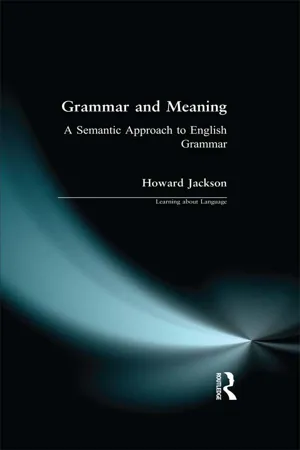![]()
CHAPTER 1
States, Events, Actions:
Verbs
What do we talk about?
Imagine a typical conversation that you might have with a member of your family or a friend, or think of the reconstructions of conversations in the dialogue of novels or plays, such as the following (from: Angus Wilson, Anglo-Saxon Attitudes, p. 52). What do we talk about?
[1] ‘Mrs Salad sent you her love,’ said Gerald to his son.
‘How the wicked prosper!’ said John. ‘You ought to meet her, Elvira; she's the living example of that Marxist myth, the lumpen proletariat.’
‘She sent you a message,’ said Gerald.
We talk about things that happen: ‘the wicked prosper’. We talk about what people do: ‘She sent you a message.’ We talk about the way people or things are: ‘She's the living example of that Marxist myth…’ We will label these meanings: event (prosper), action (send) and state (be — the 's in she's is a contraction of is, which is a form of be). And we will also refer to events, actions and states by the general term situation types.
Situation types
We have identified three situation types, which represent the general content of the messages that we communicate by means of language: STATES, EVENTS and ACTIONS (we will use capitals for semantic labels). Although the whole utterance (e.g. ‘She sent you a message’) may be regarded as reporting a situation, we have identified one item (send) in particular as representative of the situation (in this case an action). This item, together with the others that we identified (prosper, be), belong to a class of words called verbs.
Words in a language are grouped into a number of word classes (about eight in English) and subclasses, to enable us to make grammatical descriptions. Where grammar is concerned with words, it is in terms of classes and subclasses of word that the description is made, not in terms of individual words. The word-class to which a word belongs is shown traditionally in dictionaries: noun, verb, adjective, adverb, preposition, conjunction, pronoun, etc. We will discuss all of them in the course of our investigation of English grammar. In this chapter, though, we are concerned only with verbs, as the class of words whose meanings refer to situation types.
[Exercise 1]
States
We start our detailed examination of situation types by considering states. States refer to the way people or things are, what they are like, the condition they are in, where they are, the position they have taken up, and the like. Look at the examples in [2] to [8] below, which illustrate states. Do the verbs in these sentences all have the same kind of meaning?
[2] It was a quiet place [L07: 29]
[3] She was silent again [L06: 90]
[4] He had security, comfort, for a little at least [L06: 182]
[5] Andrea knew that it was purposeless to stay [L08: 21]
[6] I don't like the risk [L16: 122]
[7] She could hear faint voices the other side [L06: 10]
[8] It hurt most when she tried to twist the foot outwards [F31: 25]
Clearly, a rather wide range of meaning is expressed by the verbs in [2] to [8], though they may all be classed as state verbs. Let us now distinguish the types of state to which these verbs refer. The verb be occurs in both [2] and [3]: in [2] be predicates a quality, whereas in [3] be predicates a (temporary) state. A ‘quality’ is a more-or-less permanent characteristic of someone or something, while a ‘state’ is a less permanent type of situation. The use of have in [4], with its meaning of ‘possess’, refers, like be in [3], to a temporary state. Have may also be used to refer to a quality, e.g.
[9] Spiders have eight legs
The remaining examples, [5] to [8], contain verbs which refer to what are called private states. We can distinguish four types of private state: intellectual states, illustrated by know in [5]; states of emotion or attitude, illustrated by like in [6]; states of perception, illustrated by hear in [7], and accompanied by can/could; and states of bodily sensation, illustrated by hurt in [8]. These verbs refer to subjective states of mind and feeling.
Consider now the perception verb taste as it is used in the examples at [10] to [12] below:
[10] This soup tastes of garlic
[11] I can taste the garlic in the soup
[12] Would you kindly tast...
